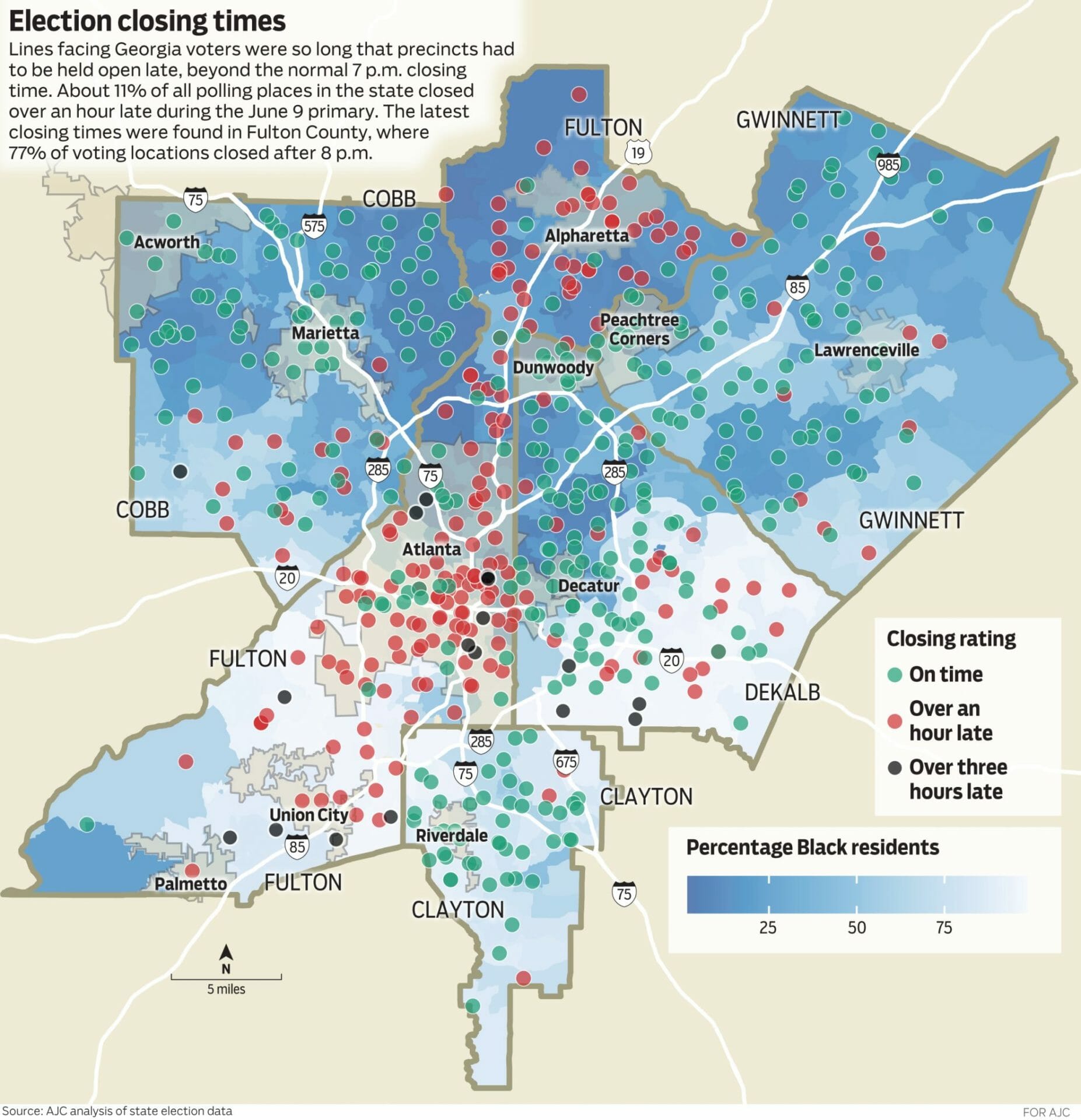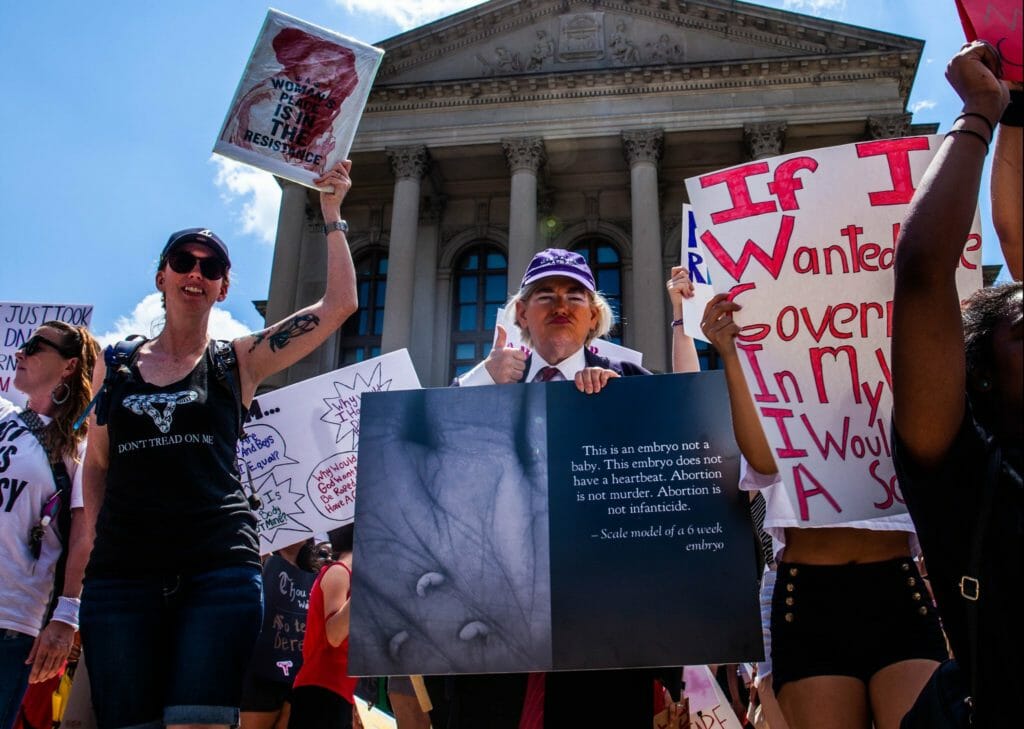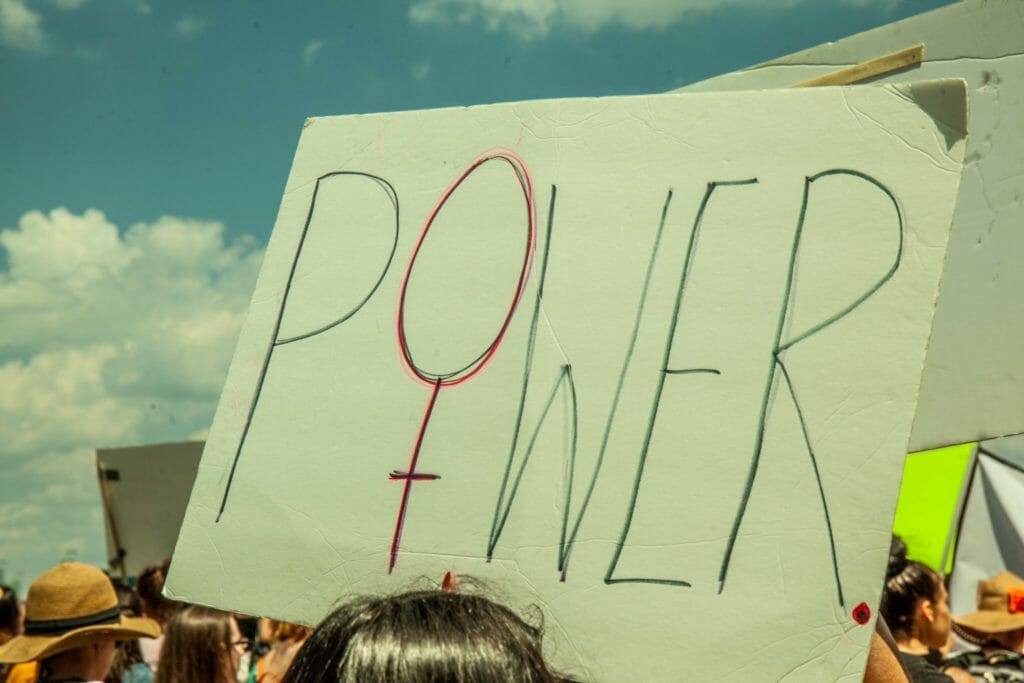A comprehensive guide to voting in Georgia as we near the most important election in our nation’s history under oppressive federal and state administrations, questions arise in Georgia concerning absentee ballots and current voter suppression efforts
Updated: Mon., Aug. 31, 4:26 p.m. to reflect the recent federal court decision in Georgia which ruled that ballots postmarked by Election Day must be counted. This removes stress from voters to make sure their ballots are received by the deadline, which was four days before Election Day on Fri., Oct. 30.
Updated: Mon., Aug. 31, 11:59 p.m. to reflect the day\’s announcement of Georgia\’s Secretary of State\’s new paperless portal for voters to submit their application to vote-by-mail.
ATLANTA — Here we are, folks. In Georgia, we are looking forward to the biggest turnout in our state’s voting history, during a global pandemic which is causing people to seriously consider their voting plans; all under an administration that’s been threatening defunding the United States Postal Service and the right to vote by mail.
Understandably, this raises a lot of questions in an election year in which there is a lot on the line as we stare down the barrel of what could very likely be Trump’s re-election (yes, I’m sounding the alarm). In Georgia, the questions are particularly abundant under the leadership of known voter suppressors Gov. Brian Kemp and his successor in the Secretary of State’s office, Brad Raffensperger.
We can’t talk about elections in Georgia without talking about voter suppression. In December 2019, Raffensperger led a voter purge across the state that removed more than 300,000 voters from the rolls, an action that we may see severely affect the current election. Shortly after the purge, Raffensperger himself admitted the process was erroneous. While Kemp was Secretary of State, whose job is to oversee and regulate fair and free elections, he executed multiple voter purges, spearheaded exact match legislation, closed innumerable polling locations across the state, and criminalized voter protection and registration efforts in the state.
Many of these actions took place while Kemp himself ran for governor in 2018 against House Minority Leader Stacey Abrams, in what became a controversial and contentious election that gained the national spotlight. Abrams lost the race by a mere 54,000 votes; data shows that 50,000 voters were removed from the rolls due to the infringing exact match policy alone. That experience ultimately positioned Abrams to serve in the role she does today as she launched her nonprofit organizations Fair Fight and Fair Count ten days after “losing” the election, which has since worked diligently to protect voters in Georgia. Fair Fight has since expanded into 19 other states. It was Fair Fight Action’s litigation team that immediately filed an emergency hearing against Raffensperger’s purge last December. Ultimately, a federal judge sided with the Secretary of State\’s office and did not require that voters be reinstated.
Of the 309,000 listed in December’s purge list, 120,561 Georgia voters were set to be removed from the rolls solely because they have chosen not to vote in recent elections. Under Georgia’s “use it or lose it” law, voters can be deemed inactive due to voting inactivity, which is highly questionable under federal law. But since the Supreme Court deemed Section 4(b) of the Voting Rights Act unconstitutional and proceeded to gut Section 5 — which required jurisdictions with a history of systemic and institutionalized discrimination to submit any proposed changes in state voting procedures to the U.S. Department of Justice — in the 2013 decision in Shelby County v. Holder. The court essentially reasoned that institutionalized racism wasn’t a thing anymore and minorities’ voting rights are no longer protected by the VRA. There has been an open assault on minorities\’ voting rights in various states ever since. (You can read more about that here.)
With these sorts of activities in mind, it is crucial that Georgians specifically have a clear-cut plan on how to vote in the upcoming election. The Oval isn’t the only thing up for grabs. We are currently in Georgia’s Senate election race between incumbent Sen. David Perdue and contender Jon Ossoff, the Senate special election which will hopefully replace the corrupt and corporate-influenced Kelly Loeffler, as well as Congressional district seats, judges, and other local positions we saw many vote for during June’s primary, which saw historical turnout numbers. Something we also saw was record long waits at polling stations, sudden polling closures, and immense voter confusion, notably in South Fulton, south Atlanta, south DeKalb, and south Cobb County. If you were wondering, yes: these are all regions that are predominantly Black.
“We’re going to have such a historic turnout, not only in numbers,” says Dreyer. “It’s going to be the most voting ever in Georgia’s history. If Georgia adds a million people every 10 years, not only are we going to have more, we’re going to have, percentage-wise, more people than that ever voted before. It’s going to be a lot. The reality of it now, the longest wait lines are in Black communities. Black voters need to start this process as early as possible so we can reduce lines on Election Day in [those] communities.”
Alright, you good? Take a breath.
Here’s our recommendation for voting in Georgia this year, based on our previous and recent research as well as an in-depth interview with attorney and Georgia House Representative David Dreyer (District 59). We will preface this in saying it is especially important for Black voters to get their plan in action as soon as possible, as history and data show their rights to vote are most likely to be impeded and infringed upon.
First things first, check to see if you are registered.
If you’re not registered to vote, you can register online to vote until Mon., Oct. 5. Again, there are a lot of places to do this. You can start with Rock the Vote or UnidosUS for our Latinx/Spanish-speaking family.
Although this year is “unprecedented” (calling it: word of the year for 2020), we’ve always had multiple options to vote. Mail-in voting began on Civil War battlefields and early voting began during primaries in 2010. So, like many preceding years, these are our options:
- Voting by mail (in these times, first choice for many)
- In-person early voting (second choice if you have problems with the absentee ballot; this is likely)
- In-person voting on Election Day (probably your last resort)
Voting by mail
Applying for your absentee ballot
The best advice we have right now is to request your absentee ballot as early as possible. It’s been reported that Georgia will begin to start mailing absentee ballots on Sept. 15. There are more than a few ways you can request your absentee ballot. For the sake of not overwhelming you with options, we are providing three:
- The Secretary of State\’s new paperless portal, which was announced to us the afternoon of Mon., Aug. 30. Here, you will need to enter your driver\’s license number or state ID number. This option allows you to apply without submitting a signature.
Once you submit your application, you will receive a printable/savable PDF with a time stamp, as well as a confirmation email. We recommend you hold on to those receipts. The application will automatically be forwarded to your local elections board. The first round of ballots will be issued around Sept. 19 or 20, according to House Rep. Bee Nguyen, District 89.
A special note here from Rep. Nguyen regarding the special election to be held on Sept. 29 for late Congressman John Lewis\’ seat:
You might notice a link to the special election to be held on Sept. 29, 2020 to fill the unexpired term left vacated by Congressman John Lewis. The person elected will serve until the end of 2020. You will also see the 5th Congressional race on the November ballot. This is for the two-year term beginning January 2021. The Democratic candidate is Senator Nikema Williams. Please note you must send a separate vote-by-mail application for this election, using the old Secretary of State website.
- www.vote.org — This site will immediately deliver your absentee ballot application via email, which you can print out, and then proceed to next steps.
- www.votesaveamerica.com — Created by the folks behind Crooked Media, this site walks you through checking your voter registration and applying for your absentee ballot application. This is the swiftest way to go if you don’t have access to a printer or scanner. You fill out the form on their site, including your signature, and they send it off for you to your county’s election board via BallotReady. Done and done. The only downside is that you have less control of your signature and risk your application being rejected due to a signature mismatch.
Once you send in your ballot, whether that be by mail, online, or in your county\’s drop box, be sure to continue to check your application’s status on the My Voter Page on the Secretary of State’s website.
Filling out your absentee ballot
Once you receive your ballot, be sure to read and follow the instructions carefully before you fill it out. You should sign both the in the form as well as on the outside of the ballot after you fold it to send it in. One thing to be particularly wary of in the context of current voter suppression efforts is the policy surrounding signature mismatches.
Right off the bat, we’re telling you to check your signature on either your voter registration card or your driver’s license and be sure to match that signature to the best of your ability. Officials will be comparing signatures and looking for what’s referred to as signature mismatches. According to Dreyer, it is currently under federal law that if signatures don’t match, they can reject absentee ballots.
“We have done a lot of advocacy around it and there have been some court cases,” Dreyer explains. “We are probably going to be as good as we can get, unfortunately, for the time being. It’s known that our signatures change over time, and it is known that when people have to sign things with a stylus, like when getting a new driver’s license, our signature is going to look different on that than what our actual signatures would look like. So you’re going to find an element of subjectivity in that, and when doing voting rights work, my experience is when there’s an element of subjectivity, it typically hurts people with less anglicized names the most.”
In case you were wondering, yes: “anglicized names” or “Anglo names” means white sounding names. This is one way minority voters get wrangled into the vast machine of voter suppression, not unlike the tactics behind the exact match policy. Our systems typically flag names that contain accents, hyphens, and non-Anglo spelling.
If your ballot is rejected due to a signature mismatch
Under Georgia law, as stated in OCGA 21-2-386, if a ballot is rejected, the voter is promptly notified of rejection; the voter then has three days after the election to submit voter ID in conjunction with an affidavit confirming the ballot was in fact theirs in order to cure the ballot.
There are myriad and longstanding problems with this, such as Georgia Republicans utilizing one of the most expensive ways to inform voters of their voting status through mail rather than text, email, or phone. With the present struggles facing the USPS, including layoffs, furloughs, defunding, and removal of equipment, this is especially alarming.
“It’s incredibly problematic, because form printed postcards are the worst way to get information to someone right now,” adds Dreyer.
There was recent advocacy in legislation to move away from this, but it was ultimately tabled and never came up for a vote.
“When the Government Affairs Committee of the House was debating some voting stuff a [couple months ago], Rep. Bee Nguyen put in an amendment that if a polling place was closed, the county election board would have to not only send a postcard with the new voting information, but would have to do a robocall,” recalls Dreyer. “Robocalls cost like half a cent per call, which is way cheaper than a postcard, but the Republicans didn’t want to vote on it, so they tabled it. They didn’t want a recorded vote on it, because their members would’ve had to vote for it and it would have [been made] into law. So instead, they tabled the question and that never came up for a vote.”
If your ballot is rejected due to a signature mismatch, we recommend you move to plan to vote in-person during early voting.
If you send a ballot in, and it is returned as undeliverable
If you sent in an absentee ballot by mail and it is returned as undeliverable, you’re to be placed on inactive status. This can occur simply because the postal service messes up and doesn’t properly deliver your ballot or the address was wrong. Please know that this is to create voter confusion ahead of the election. Creating voter confusion is one of the more nuanced, commonplace forms of voter suppression we see today.
Some folks experienced this prior to the general election. This is a step to canceling voter registrations and is currently affecting tens of thousands of Georgians.
“If your absentee ballot in the last election was returned to the Secretary of State, you’re on the inactive voter list and you’re going to get notice that you’re on the inactive voter list,” explains Dreyer. “[This] is going to confuse voters and it can certainly have a bigger impact in our 2022 governor’s race, because if they’re inactive after this election, they will be purged.”
According to the AJC, “voters who respond to those letters within 40 days will retain their active status, but many voters won’t receive the letters because they were mailed to the same addresses where they were undeliverable in the spring.”
If this did happen to you or it does happen to you, don’t panic and don’t throw your hands up. Being placed on inactive status now does not mean you can’t vote this November. To emphasize: if you receive a notification of inactive status within 90 days of an election and/or your absentee ballot is returned as undeliverable, you can still vote in November. The National Voter Registration Act requires states to complete any program with the purpose of systematically canceling voter registrations at least 90 days before a federal election (which is probably why the last voter purge was conveniently in mid-December).
If you’re on the inactive voter list, the Secretary of State is required to notify you through a postcard in the mail about your current status. Again, this is highly problematic for various reasons. Please pay attention when collecting your mail to see if you receive one of these notices. If you’re currently on inactive status, although you can still vote this November, you’re up for being purged in the next round. Contact Fair Fight immediately to learn more about reinstating your active status.
Drop off your ballot
We recommend not depending on mailing services at all and dropping off your ballot in person at your county’s drop box location. You can also ask a friend, family member, or roommate to drop it off for you. The Georgia Democrats’ official website has an updated list of every county’s drop box locations, which you can access here.
Update: A federal court ruled on Mon., Aug. 31 that ballots that are postmarked by Election Day must be counted. This differs from the state\’s original law that stated all absentee ballots must be received — not just postmarked — four days before Election Day. This new decision is expected to alleviate a lot of stress for Georgia voters while depending less on the USPS. We still recommend voters get their ballot applications and absentee ballots in as soon as possible. We also still recommend voters utilize in-person drop boxes in their county to avoid chances of their ballot being deemed undeliverable.
In-person early voting (Oct. 12-30)
Whether your ballot is rejected due to a signature mismatch or your ballot doesn’t arrive on time (which is likely, as recent history shows), your next choice is in-person early voting. We are still in a pandemic, so of course, be sure to follow all necessary precautions (mask, hand sanitizer, six feet, you know the deal). It would be in all of our best interests for those who plan on going to vote in person to get tested beforehand. Here’s the list of testing locations in Georgia.
“If it’s getting late and close to the election and early voting has started, and it feels like there is a big rush — and they’re going to have a lot of people doing it, especially the last few days of early voting — I would just go ahead and go vote anyway,” adds Dreyer. “You can cancel your absentee ballot and go ahead and vote in person. That’s really important on Election Day. If you don’t have your ballot during early voting, because you haven’t received it or you just misplaced it, go early vote and get it done. If [you choose to go] on Election Day, same thing.”
You are not required to do anything other than show up to your polling place with your driver’s license and inform the poll worker that you had applied for an absentee ballot. You are not required to have your ballot with you and you do not need to cancel the ballot online or over the phone.
“Tell the poll worker you need to [cancel your ballot],” emphasizes Dreyer. “Tell a poll worker you requested an absentee ballot, but you didn’t vote with it. You have to sign [an affidavit] that says you didn’t vote your absentee ballot.”
With early voting, you are free to go to any polling location that’s open, now including the State Farm Arena, rather than the one assigned to you per the address on your voter registration. On Election Day, you are to go to the polling location as it’s listed on your voter registration.
In-person voting on Election Day
You can check your polling location on the Georgia My Voter Page on the Secretary of State’s website. This is where you need to show up on Election Day. There’s no special instruction here, except to expect to be in line for a long time. As mentioned above, take the necessary precautions for COVID-19 and consider getting tested beforehand. Additionally, we will need folks to turn out to support those waiting in line with food and water.
Now, let’s say you feel a bit outraged after learning about or even experiencing voter suppression in Georgia. Let’s say you’re at least 16 years old and want to do something about it. Legislators, organizers, and activists are encouraging folks to serve as poll workers during the election. The hours are a bit long, but it pays and food is provided. We especially need those who are tech-savvy (looking at my fellow millennials and all you Gen-Z’ers) and we need people to step up this time more than ever, since poll workers in Georgia are overwhelmingly older and Black — two populations that are more vulnerable and disproportionately affected by COVID.
“It’s over $200 for the day, but you have to be there early, like 6 a.m. until it closes, which can be anywhere from 8 p.m. to 1 a.m.,” says Dreyer. “We need younger people with experience in technology, because you got to hook up three or four different kinds of machines. You [have] to maintain them throughout the day, fix paper jams, reset them, etc. You’ve got to close them down at the end of the day. That’s where we need people involved right now.”
Recruitment for more poll workers is a nonpartisan effort, but there are ongoing voter protection efforts, as well.
“Poll watchers, you’re just a citizen,” Dreyer explains. “You’d show up, unaffiliated with any party, and you go to work. There will be large voter protection efforts and those will be people that aren’t poll workers. They’ll be outside of polling precincts, they’ll be manning phones, all kinds of things. Fair Fight has a 501(c)(3) that’s doing it and Election Protection is a national nonprofit that’s doing it. Asian Americans Advancing Justice is doing that work here in Georgia and the metro area has a 501(c)(3), too. They’re going to want more lawyers in that one, but there is room for other people.”
If you want to work as a poll worker, you have to live in the county you want to serve, which, according to Dreyer, is another policy Democrats are fighting to change. As mentioned above, the most help is needed in South Fulton, south Atlanta, south DeKalb, and south Cobb County. You can find out more information about becoming a poll worker here.
If you are interested in working with voter protection efforts (also assuming that you, dear reader, don’t want to lift a finger to help Republicans), you can sign up to volunteer remotely via the Georgia Democrats Voter Protection Hotline here or you can sign up to be an in-person volunteer here.
While many are not particularly thrilled about the conditions surrounding this particular election, whether that be who’s on the ballot, the GOP’s consistent and shameless voter suppression efforts, our government’s failure to properly fund the USPS, or our governor’s failure to lead during the pandemic, there is one bottom line: this isn’t about us.
This is part of the fight to protect the vulnerable, just as the fight always has been. If we can safely show up for Black lives in the form of protests, we can do the same for them at the polls as workers and voters in continuing the fight to protect the most vulnerable while defending our democratic institutions in a state where catastrophic and systemic oppression against BIPOC lives has ceased to let up for decades upon decades.
To our fellow progressives: remember, your vote is not an endorsement. It\’s a strategy. Vote for which battle you want to fight beyond 2020: neoliberal elites or a neofacist. Because once we\’re through this election, no matter which way the pendulum swings, the fight is far from over.
If you experience any problems voting prior to or on Election Day, or have any questions, call the Democratic Party’s Voter Hotline at 1-833-DEM-VOTE (1-833-336-8083).




